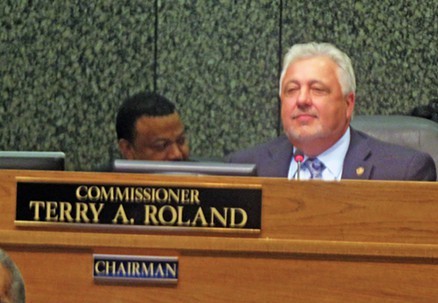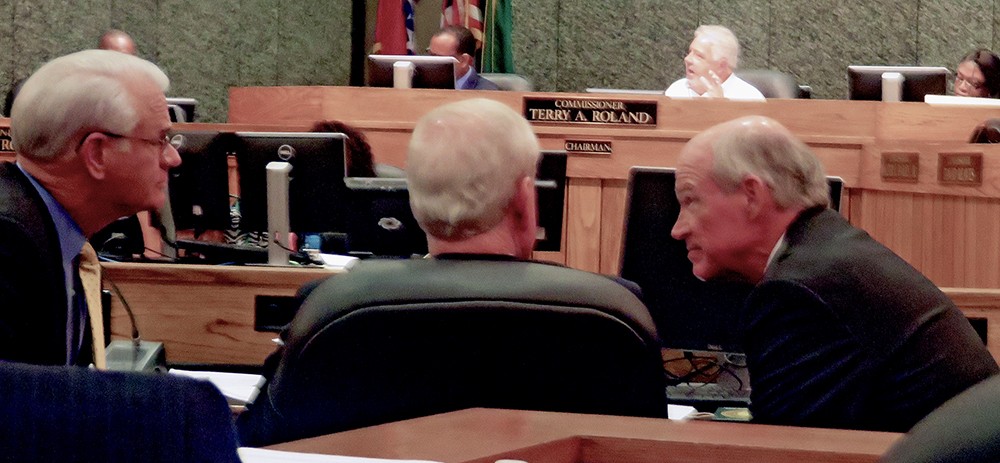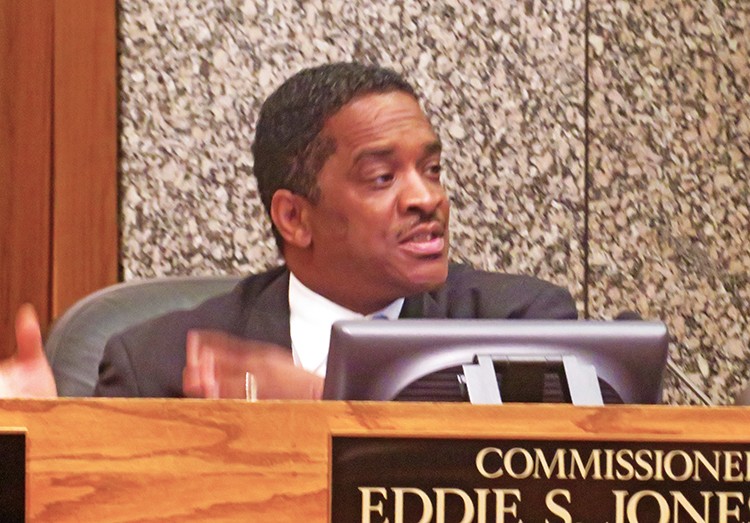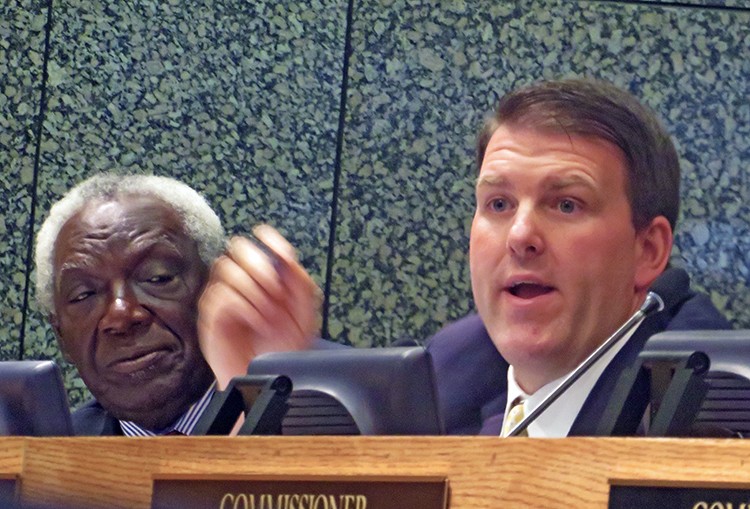
Tempers flared during Monday’s regular meeting of the Shelby County Commission. Big time.
And the surface turbulence led to the uncovering of a behind-the-scenes matter involving a claim by several other commissioners that commission chairman Terry Roland has engaged in threatening behavior toward them.
The precipitating issue was the commission’s consideration of a proposal from former Memphis Mayor Willie Herenton to build two educational residence facilities for convicted juvenile offenders in Frayser and in Millington.
The commission voted 8-2 to endorse the project, a sort of combination charter school/incarceration model that would locate juveniles in a dormitory situation close to their families. Called the NewPath Restorative Campuses, the proposed facilities would be run by a nonprofit group and would be privately funded, for the most part, requiring no outlay of county money.
The project would be boosted by an allocation of state funding — some $17.5 million that is now going to the Wilder detention facility in Fayette County — and that fact was cited by Roland as a reason for his support.
“He’s not asking us for any money,” Roland noted about Herenton, a former school superintendent who is now executive director of the W.E.B. DuBois Consortium of Charter Schools and who would direct the facilities’ educational operations. “They’d be spending $47 million for each facility,” said Roland, and would be generating 600 jobs for his own community of Millington.
The commission’s vote of approval indicates that most commissioners bought into that reasoning. Commissioner Walter Bailey was one who did not, however.
Though he praised Herenton as an individual and a professional, Bailey demurred, citing what he said was incomplete information about the project, as well as his aversion to what was basically a privatization of functions that were traditionally public.
Herenton became visibly angry, criticizing Bailey for having “the audacity to pontificate” and telling the commissioner, an African American like himself, that 85 percent of the juveniles to be housed “look like you and me,” and would be the beneficiaries of superior educational and wraparound services currently unavailable to them.
Still steaming after the vote, Herenton was heard to mutter the word “bullshit” in regard to Bailey’s objection.
Other commissioners had misgivings, as well. Mark Billingsley, who joined Bailey in abstaining on the vote, and George Chism and David Reaves, both of whom voted no, all cited what they said was a lack of specific information about the project.
After the vote, Reaves became involved in a disagreement with Roland that resulted in an actual physical altercation. It took place off the main commission chamber in a back room that is often used for conferences.
Roland and Reaves differ in their accounts of what happened. According to Roland, Reaves approached him and “put his finger on my nose.” The commission chairman said that Reaves then accused him of “selling out my race” by supporting the Herenton proposal.
Both commissioners agree on what came next. Roland shoved Reaves.
“All I did was get him out of my face,” Roland said. “I was clearly in the right. The dude came up on me.”
“I never touched the man,” said Reaves, who further denies mentioning the word “race” in the context claimed by Roland. “I told Terry he was selling out his constituents,” said Reaves, who added that he was confident that, based on the political history of Memphis and Shelby County, people in Millington, like those in Bartlett, would object to giving former Mayor Herenton an unconditional approval for his project.
He said that if he mentioned the word “race,” it was probably to suggest that Roland, an announced candidate for county mayor in 2018, was using his support for the project to play politics on behalf of his political race.
Commissioner Heidi Shafer, who was in the back room conferring on a matter with Kim Hackney, assistant CAO for the county administration, became aware of the fracas and rushed out to locate a deputy sheriff serving as bailiff, returning with him to find the disturbance apparently over.
“I couldn’t really tell who did what to whom,” Shafer said. About Roland, she said, “Terry’s definitely not a turn-the-other-cheek kind.”
Reaves later identified Billingsley and Chism as other commissioners toward whom Roland had displayed “bullying” and threatening behavior. Both confirmed having had such experiences.
Said Billingsley: “Terry has threatened to beat me up in front of several county staffers in the hallway. He consistently displays bullying behavior. Anybody who disagrees with him about anything is met with great hostility. That’s unbelievably unprofessional. There’s no place for it in government, and it sets a very poor example for a community that already has too much hostility on its hands.”
Chism had a similar account: “Terry once lost his temper with me. He was very aggressive, and there were people in the office that heard it. It was all over a resolution that I wouldn’t co-sponsor, but he insisted he wanted my name on it.” Chism said Roland was “way over the line,” but that he “immediately apologized.”
These new claims of belligerent behavior on Roland’s part are reminders of previous circumstances involving the Millington commissioner and his colleagues. Former Commissioner Steve Mulroy said back in 2011 that Roland had cornered him in the commission library and said, “You and I are never going to agree. There’s only one way to settle things. We’re going downstairs, and I’m going to whip your ass!”
At the time, Roland said, “Aw, heck, I was just kidding with him,” and, though Mulroy still insists he believes Roland was serious in his threat, the two commissioners would ultimately let the matter subside with jocular references to a potential boxing match for charity.
In 2012, Roland was the featured speaker at a meeting of the Collierville Republican Club when several fellow GOP Commissioners, who favored another approach, began heckling him.
Interpreting a muttered phrase from then-Commissioner Chris Thomas as a disrespectful jibe about his late father (Thomas denied saying anything of the sort), Roland threatened to “knock you out of that chair.” Then-Commissioner Wyatt Bunker called the Collierville police, who arrived after the meeting was over but found nothing amiss.
On that occasion, Roland insisted he was the one being bullied, and he had similar words for his disagreement with Reaves Monday. “I’m not going to let politics get in the way of making a good decision to help our people,” he said. “I’m not going to be bullied. I’m trying to do what’s good for everybody.”
And Roland reciprocated Reaves’ charges of political motivation by accusing Reaves, Billingsley, and Chism of being partisans of Roland’s potential mayoral opponent, current county Trustee David Lenoir. He said the three also were supporters of former U.S. Attorney David Kustoff in the 8th Congressional District GOP primary and that he, by contrast, intended to remain neutral.
Meanwhile, Billingsley revealed that in April he had queried then-County Attorney (now appellate Judge-designate) Ross Dyer, as follows: “It is unfortunate I have to inquire for a county attorney opinion, but I have no other choice. If a Shelby County commissioner contacts another Shelby County commissioner … and threatens their ability to put items on the… Commission agenda, threatens lack of funding, and threatens their ability to serve in their [elected] capacity, based on their personal animosity [toward] that individual, would this be considered official misconduct? Additionally, is there a process for reporting?”
Dyer, whose investiture as a Judge in the Court of Criminal Appeals will take place this Thursday, promised at the time that an answer would be forthcoming at some point from himself or from his staff.
 Greg Cravens
Greg Cravens  Jackson Baker
Jackson Baker 



 JB
JB  JB
JB  JB
JB 